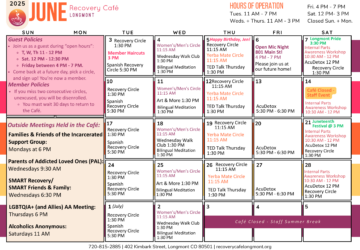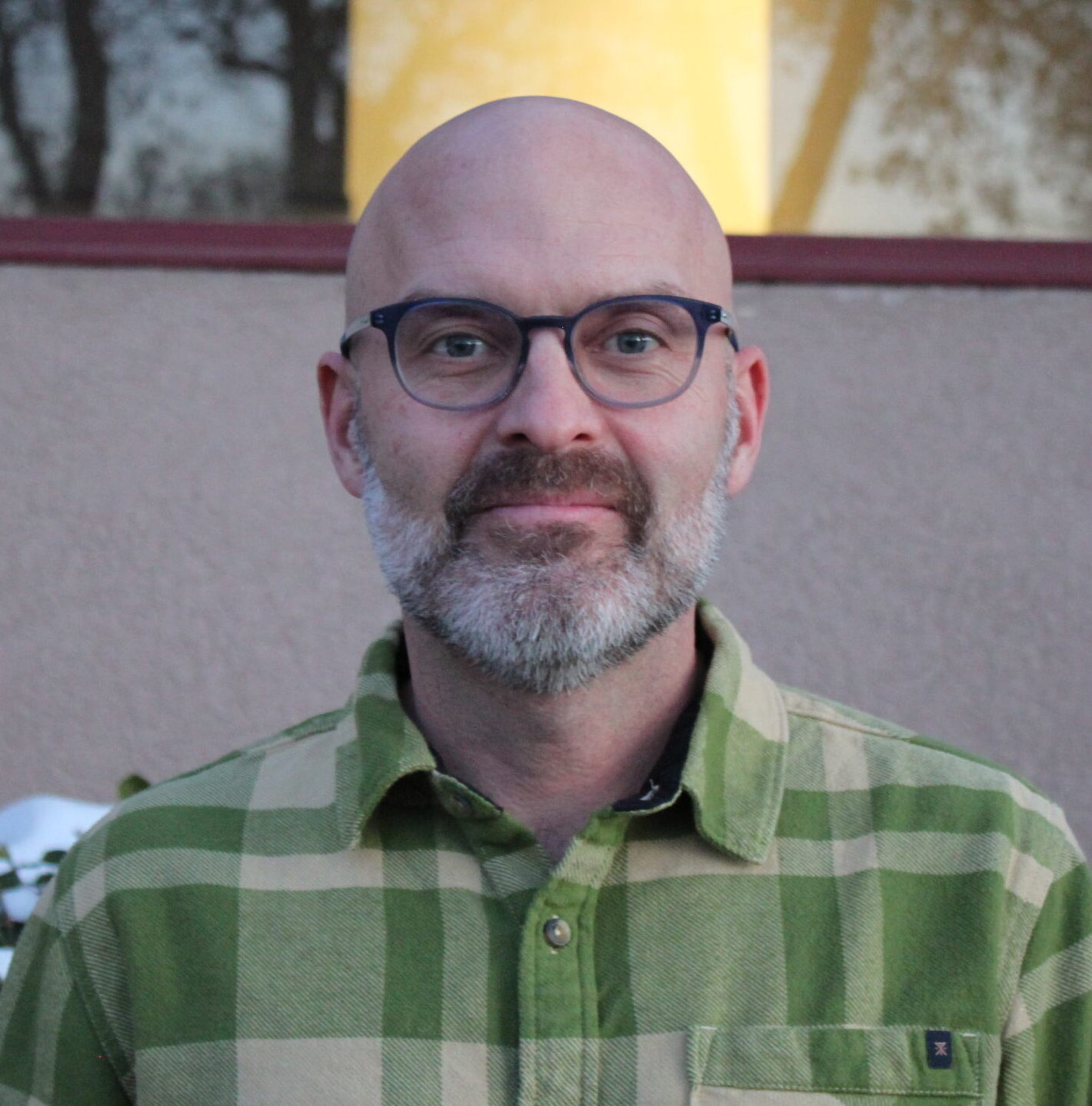
June 2025 Calendar
Story
Read More
Matt McKinney is a transplant from the Midwest who has been in Colorado for the majority of his adult life. Having taught in Africa through the Peace Corps and practiced law from California to Colorado, he is a well-traveled, quick-witted, and compassionate member of the Longmont community. After serving on a few boards over the years, Matt has returned to service at the Café – learn more about his route to being a part of Recovery Café Longmont.
L: So, what is your name?
MM: Matt McKinney.
L: And where are you from?
MM: I was born in Tucson, Arizona, then moved to Clinton, Iowa, where my parents are from, and grew up there. I moved out to Colorado in 2002 after graduating from law school.
L: How long have you been on the RCL board?
MM: Just about six months.
L: What is your professional background?
MM: I am an attorney working for a Colorado-based law firm that specializes in business, corporate, and transactional law; we’re not in courts or dressed up in suits, not litigators. We spend a lot of time drafting and negotiating contracts, which is a gross oversimplification.
L: Is that what you always planned to do?
MM: Actually, right out of college, I developed photos in Montana, I was a teacher in the Peace Corps, and dipped my toes in law in San Francisco, working for a firm there.
L: How did you get connected with the Café?
MM: Virginia is a good friend from past non-profit service, and she reached out inviting me to tour the Café. That was the first ripple in the water – I was taking time off from board service and looking for advice on finding an organization, which led to another conversation with Virginia, where she told me the board was looking to expand. Through these discussions and meeting Jen, everything snowballed, and it was the right place at the right time.
L: And it just so happens that your mom (Beth) volunteers here too?
MM: It just so happens that my mom volunteers here!
L: She was here first?
MM: Yes – and it’s not all totally a coincidence, as we were drawn to the organization for the same reasons. Some of the same people in our lives are in recovery, so it’s not wildly surprising that we’re both here. And, as I’ve learned through chatting with the staff, she’s a very valuable part of the community.
L: This is true. We love her. So what drew you to say yes to joining the board?
MM: One aspect was my trust and respect for Virginia – if she vouches for something, it gives me confidence. Also, having a personal connection with loved ones who are in recovery, seeing the various approaches to recovery, and recognizing the need for a more inclusive and secular approach. What I appreciate about what RCL does is that it’s not based on any ideology, other than being inclusive and accepting.
L: How has being a part of this organization impacted you?
MM: As I’m sitting here in this interview, looking out and watching things in action, there’s a simplicity to it – people just have a safe space. There’s community, connection, and a welcoming space. These are all simple things that come together and create something more complex. It truly reinforces the power of community, respect, and empathy, which I think are the keys to this organization.
L: How would you describe the role of a board member to someone who’s never served on a board before?
MM: I’ve been on four or five boards. I think the board serves different purposes depending on where the organization is in its growth cycle. In a younger organization, the board functions more as a “working board,” and day-to-day responsibilities are taken on. As organizations get more mature and have stronger executive leadership, the board serves as more of a strategic sounding board, acts as financial stewards, and ensures that the organization is still aligned with its mission. In short, it’s support and supervision.
MM: Another important aspect is that we all come from different backgrounds, and each of us gets something out of serving on the board. If the board isn’t finding personal growth and development in their service, the board is not working correctly.
L: What part of our mission speaks to you the most?
MM: The concept of community resonates the most with me. Creating a place that allows human interaction amongst folks with a common goal, which is so simple but again complex.
L: Has there been a moment in your time on the board where you’ve been reminded of the importance of the work/mission?
MM: Just seeing it in action – seeing people chit-chatting, finding their space, it’s interesting to see how everyone utilizes this place differently. It highlights that recovery is different for everyone and there is no one-size-fits-all approach, which the Café creates a safe space for.
L: What makes the Café unique?
MM: Again, not being faith-based, but also the inclusivity. The requirements [for membership] are simple and reasonable, and there’s an understanding that they exist to protect the space.
L: What does community mean to you?
MM: A place or space where individuals can engage, support each other, and share. It’s a timeless connection between people with a notion of support, respect, and common understanding.
L: What are your hopes for the organization in the next few years, and what kind of impact do you hope we’ll make?
MM: Of course, I want to see the new building come to fruition.
L: Don’t we all!
MM: That’s the easy answer – but we all know it’ll be such a game changer for visibility and accessibility. On top of that, I want to see continued growth from people served, to membership, and general growth. Through more visibility and a new space, we’ll be able to offer more services, which I hope will reach the whole spectrum of people in recovery.
L: What’s your favorite event from the Café you’ve attended?
MM: The Open Mic Night I attended was very entertaining, but just sitting here and being here for lunch is so meaningful. Seeing it in the day-to-day cadence helps you see how unique and special each day is here.
____________________________________________________________________________________________________________
L: What are your hobbies and interests?
MM: Outside of work, I enjoy riding my bike, traveling, a lot of travel for soccer around my kids’ schedules, and those are the key outside activities.
L: How old are your kids?
MM: I have an 18-year-old and his last day of high school is today — he graduates a week from Saturday, and a 14-year-old who is going through the transition from middle to high school next year.
L: What is the best book you’ve read?
MM: I’m working my way through “The British Are Coming” by Rick Atkinson. I’m both enjoying it and fighting through it. It’s highly researched with first-person accounts from people like George Washington to privates in the Revolutionary Army.
L: Movies or TV series?
MM: At this stage, TV fits into my schedule a little bit better; it’s more bite-sized.
L: What is something you never leave the house without?
MM: Some flavor of a little notebook – the current one is Bob Ross. I can’t figure out how to organize my life on the phone or the cloud, so I have about a dozen of these, and I get so much happiness from crossing things off the list.
L: Who is your role model?
MM: In this space, I think about my mom a lot. I’ve seen from her perspective how important her time here is – and in hearing from everyone who works here, I understand how genuinely appreciated she is. This has been a great social outlet and experience for her – her spirit of giving first and finding value in that is admirable. It’s a reminder to push ourselves outside of our comfort zone.
L: And finally, what does your perfect day look like?
MM: Weather-wise, a nice sunny, Colorado day in the spring, where the flowers are blooming. No work, a cup of coffee with the newspaper, then some kind of family activity or riding my bike around Boulder County with some buddies. Wrapping it up with a family dinner, either out or on the grill, and a movie or game night – that’s it!